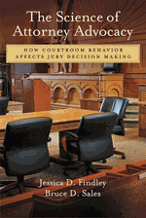Successful advocacy approaches are essential for the practice of law. Lawyers, law professors, judges, and other legal commentators have offered numerous recommendations for how trial lawyers can persuade juries, including techniques in verbal and nonverbal communication, attorney demeanor, and so forth. These recommendations have been put into trial practice handbooks and are frequently taught in law schools as part of the trial advocacy curriculum. However, they often rely on popular assumptions or intuition rather than social and behavioral science. Research is needed to differentiate intuition and speculation from scientific proof of efficacy.
This book fills this critical gap by reviewing the scientific support for popular advocacy recommendations. It first summarizes trial commentators' recommendations, then reviews the scientific support for these recommendations, and finally evaluates the recommendations in light of the scientific support. Research is culled from not only trial and simulated trial settings, but also other social and behavioral settings. Topics include attorney demeanor, verbal and nonverbal communications, the attorney-client relationship, and storytelling (narrative techniques).
This book will appeal to researchers in psychology, communications, linguistics, and other social sciences, as well as trial commentators and practicing attorneys.



 The College of Arts
The College of Arts